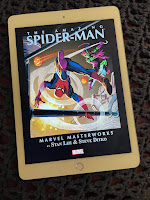

Mystery & thriller writer Brad Meltzer has many of his popular titles available on Kindle. Recently, however, I told you that I was reading and enjoying something a little unusual by Mr. Meltzer: a comic-book story- involving DC Comics' most popular superheroes, no less- called Identity Crisis. Written by Mr. Meltzer and drawn by fan favorite comics artist Rags Morales, it was quite a tale, and thought I'd tell you a little more about it now that I finished it.
Brad Meltzer and Rags Morales' Identity Crisis collects the original seven-part DC Comics mini-series into an extremely engaging and entertaining superhero epic, which interestingly doesn't have all that much to do with superheroics.
What we have here is a clever and well-crafted mystery story revolving around the death of Sue Dibny, wife of Ralph Dibny, the DC hero known as The Elongated Man. The usually gentle Ralph is both devastated and angered by his wife's murder, and soon enlists the aid of his many (and better known) superhero friends to solve her murder and bring the killer to justice. Soon, the likes of the Flash, Green Lantern, Wonder Woman, Superman, Batman, etc. are on the case.
What's interesting here is that the various heroes are portrayed as flawed humans, not moral paragons. Indeed, the story purports that maybe these heroes were never all that innocent to begin with, even back in the early days when their comic book adventures were bright and cartoony and fairly kid-oriented. Maybe in this post-Watchmen comics era it isn't all that unusual to see a little darkness in our comics heroes, but true moral compromise by a big company's flagship heroes is still a pretty rare thing, and made me sit up and take notice in Identity Crisis.
In particular, there's a flashback to an early Justice League adventure (an actual comic book story published decades ago) where a team of super villains switches minds with the Justice League, effectively taking over the bodies of the League's members. Even then, many kids must have asked, "Hey, when the bad guys were inside the bodies of the heroes, why didn't they unmask them and see who they really were?" Well, Identity Crisis purports that the villains did indeed do that, and that the heroes, once the villains were defeated, engaged in some pretty controversial activities (somewhat reminding me of the memorable, chilling close of "One Flew Over the Cuckoo's Nest") to restore things to normal and protect their identities. Further, the story demonstrates that those activities, and similar past practices (most would say, abuses), are now tainting the way the heroes are now operating, and are maybe indirectly responsible for the murder now laid at their feet.
I didn't mind the controversial, often negative portrayal of the heroes in Identity Crisis. This approach made them more complex and interesting to me. In any event, nothing they did was as unsavory as say, the sight of King Arthur drowning babies in the early chapters of DC's Camelot 3000. Now that kept me from enjoying the rest of the book, no matter that the king later regretted his actions.
I hope that Brad Meltzer, who usually earns his living as a bestselling mystery writer, will occasionally return to the world of comics and write more stories as good as Identity Crisis. In fact, I'm off to search Amazon to see if he already has.
In the end, if you like comics or you like mysteries, Identity Crisis should be quite enjoyable to you; and if you like mysteries and comics, you should especially run right out and get it. One of these days comic book stories will be easily readable on the Kindle. Until then, you won't regret taking a break from your Kindle to check this out.
The photo accompanying this post shows Mr. Meltzer. The drawing of Wonder Woman is from one of the individual installments of Identity Crisis, before all the chapters were collected into the one complete volume discussed here.




No comments:
Post a Comment